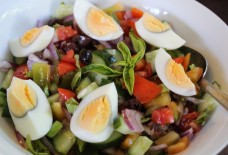Syrian-Americans Use Garden in Cleveland to Celebrate Culture
Local Syrian-Americans devoted months of research, discussion and fundraising to be ready for Sunday, when they will become the first Arab-American community to join the Cleveland Cultural Gardens. Then real-world events exploded to cast a shadow over a long-awaited cultural celebration.
When they raise the Syrian flag in Rockefeller Park, community leaders plan to acknowledge the turmoil back home and hold a moment of silence for the victims of violence.
They do not feel emboldened to do much more. Not only is the strife a world away, but it also presents sensitive issues to a small but diverse immigrant community.
“This garden, like all the cultural gardens, is meant to memorialize and celebrate the culture of the homeland,” said Dr. Wael Khoury, president of the Syrian Cultural Gardens Association. “We’re not adding the politics of the homeland.”
With the addition of Old World politics, a Syrian garden might never have bloomed.
The local Syrian community, estimated at several thousand people, traces its origins to a Greater Syria that once included Lebanon, and local Syrian-Americans are as likely to be Christian as Muslim. It is also a largely professional community with significant numbers of doctors.
Members of both religions recoil at the bloody crackdown on anti-government protesters under way in Syria and express fear for the safety of loved ones. But they view the prospects of regime change from different perspectives.
Christian Syrians shudder to see what’s happening to minority communities elsewhere during the Arab Spring as autocratic governments teeter and fall. Coptic churches are being set ablaze in Egypt. Islamic extremists are driving ancient Christian sects from Iraq.
Muslim Syrians, often the more recent immigrants, are more likely to feel a personal connection to the daily news.
As the protests grew, Syrian President Bashar Assad sent tanks and soldiers into restive cities. About 1,000 people have been killed by security forces in the last nine weeks, according to human-rights groups, and perhaps 10,000 protesters and activists are in jails.
“The people in this regime are cruel,” said a prominent member of the local Syrian-American community, a Muslim who did not want his name publicized.
“I still want to go back and visit my parents,” he explained.
He said he understands the concerns of minority Christians. He also said he worries they might report him to the Syrian government should he be openly critical, exhibiting some of the lingering Christian-Muslim animosity.
The political turmoil brought some of those sentiments to a cultural garden project.
“Nobody can deny there’s serious trouble over there,” said Bassam Khawam, a Christian from Lebanon and a member of the garden’s board of directors. “We’ve been dealing with it every day: how to be sensitive and how to bring the whole community together.”
The board considered postponing Sunday’s dedication and festivities in deference to those who have been killed or terrorized back home. After much discussion, members decided the project had come too far and that there may never be a perfect time.
A Syrian Cultural Garden, first proposed in 1929, became a reality through an effort that tapped the talents of the broad Syrian community: Muslims and Christians, immigrants and native-born.
Syrian-American doctors led fundraising efforts, and Syrian-American architects and engineers pursued a design that adds a touch of ancient Syria to Martin Luther King Drive.
Three Syrian-style arches rose this spring behind a white stone amphitheater reminiscent of the ancient amphitheater of Basra. An Arabic-style fountain will bubble in the center. Plantings will include Damascus roses and cedars of Lebanon.
“Everybody’s proud of this project,” engineer Jamil Dayeh, the project manager and a Muslim, said as he surveyed the garden on a recent morning. “We’re very proud of being of Syrian descent and being American.”
The daylong celebration Sunday will feature a dedication ceremony at 11 a.m. followed by a picnic with Middle Eastern foods. At 2 p.m., experts in Syrian architecture, history and culture will address a symposium at the Cleveland Museum of Art. The day climaxes with a gala dinner featuring Syrian entertainers at the InterContinental Hotel.
Khoury, the director of cardiology at Marymount Hospital, notes that many of the cultural gardens were built by groups whose homelands were in crisis, trapped behind an Iron Curtain or in the throes of political disarray.
The ethnic communities often found unity in Greater Cleveland and in a garden chain that represents peace and universal brotherhood. He expects much the same to happen to the Syrian community.
“We look at this as a unifying project,” he said. “We all live in harmony here, among each other in America.”
Robert L. Smith
The Plain Dealer


